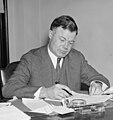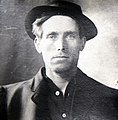Portal:Organized Labour

Introduction

- In trade unions, workers campaign for higher wages, better working conditions and fair treatment from their employers, and through the implementation of labour laws, from their governments. They do this through collective bargaining, sectoral bargaining, and when needed, strike action. In some countries, co-determination gives representatives of workers seats on the board of directors of their employers.
- Political parties representing the interests of workers campaign for labour rights, social security and the welfare state. They are usually called a labour party (in English-speaking countries), a social democratic party (in Germanic countries), a socialist party (in Romance countries), or sometimes a workers' party.
- Though historically less prominent, the cooperative movement campaigns to replace capitalist ownership of the economy with worker cooperatives, consumer cooperatives, and other types of cooperative ownership. This is related to the concept of economic democracy.
The labour movement developed as a response to capitalism and the Industrial Revolution of the late 18th and early 19th centuries, at about the same time as socialism. The early goals of the movement were the right to unionise, the right to vote, democracy and the 40-hour week. As these were achieved in many of the advanced economies of western Europe and north America in the early decades of the 20th century, the labour movement expanded to issues of welfare and social insurance, wealth distribution and income distribution, public services like health care and education, social housing and common ownership. (Full article...)
Selected article
The Spartacist uprising (German: Spartakusaufstand), also known as the January uprising (Januaraufstand), was an armed uprising that took place in Berlin from 5 to 12 January 1919. It occurred in connection with the November Revolution that broke out following Germany's defeat in World War I. The uprising was primarily a power struggle between the Social Democratic Party of Germany (SPD) led by Friedrich Ebert, which favored a social democracy, and the Communist Party of Germany (KPD), led by Karl Liebknecht and Rosa Luxemburg, which wanted to set up a council republic similar to the one established by the Bolsheviks in Russia. In 1914 Liebknecht and Luxemburg had founded the Marxist Spartacus League (Spartakusbund), which gave the uprising its popular name.
The revolt was improvised and small scale and quickly crushed by the superior strength of government and paramilitary troops in what became known as Bloody Week. The death toll was roughly 150–200, mostly among the insurgents. The most prominent deaths were those of Liebknecht and Luxemburg, who were executed extrajudicially, almost certainly with the approval of the leaders of the provisional SPD-led government. The party's involvement hampered its position throughout the life of the Weimar Republic, although quashing of the uprising did allow elections for the National Assembly to take place as scheduled on 19 January. The Assembly went on to write the Weimar Constitution that created the first functioning German democracy. (Full article...)May in Labor History
Significant dates in labour history.
- May 01 - In 1884 Proclamation of the demand for eight-hour workday in the United States. Two years later, in 1886, the general strike which eventually won the eight-hour workday in the United States, began. These events are today commemorated as May Day or Labor Day in most industrialized countries; Thomas Lewis died; the 1946 Pilbara strike occurred in Australia; International Woodworkers of America merged with the International Association of Machinists; Mike Watson was born; the Taksim Square massacre occurred in Turkey in 1977
- May 02 - Nazi Germany outlawed free trade unions and established the German Labour Front; Bernice Fisher died
- May 03 - The International Typographical Union was founded; the Bay View Tragedy occurred in 1886 in the U.S.
- May 04 - Haymarket Riot occurred in 1886 in the U.S.
- May 05 - John Sweeney was born; Jackie Presser stepped down as Teamsters president due to cancer; James Duncan was born
- May 06 - Miguel Contreras died; Frank Fitzsimmons died; Ludvik Buland was born
- May 07 - Miguel Contreras was born; Maurice Hutcheson was born; David Sullivan was born
- May 08 - Jerome Wurf was born; the Hard Hat riot occurred in the U.S. in 1970
- May 09 - Elias Motsoaledi died; 1934 West Coast Waterfront Strike began in the U.S.
- May 10 - Isaac Theophilus Akunna Wallace-Johnson died; Walter Philip Reuther died; the 2008 Skorpion Zinc Strike began in Namibia
- May 11 - William Konyha was born; Pullman Strike began in 1894 in the U.S.
- May 12 - Coal Strike of 1902 began in the U.S.; the American Maritime Officers was founded
- May 13 - Henk Sneevliet was born
- May 14 - Arthur Moore (labor leader) was born; the Ådalen shootings occurred in Sweden in 1931
- May 15 - Pope Leo XIII issued Rerum Novarum; Winnipeg General Strike of 1919 began; George Mock stepped down as president of the Teamsters after eight days; the Ulster Workers' Council Strike began in 1974 in Northern Ireland; the U.S. Supreme Court decided Gompers v. Buck's Stove and Range Co.; Arthur Creech Jones was born
- May 16 - The Minneapolis General Strike of 1934 began in the U.S.; the Iraqi Federation of Trade Unions was founded; the U.S. Supreme Court decided NLRB v. Mackay Radio & Telegraph Co.; A. Philip Randolph died
- May 17 - The first Starbucks Workers Union was organized; former trade union leader Francisco Largo Caballero was deposed as prime minister of Spain
- May 18 - Bill Haywood died; the Atlanta transit strike of 1950 began in the U.S.
- May 19 - James P. Hoffa was born; the Battle of Matewan began in 1920 in the U.S.
- May 21 - Cyrus S. Ching was born
- May 22 - Agustín Tosco was born; the Steel Workers Organizing Committee was disbanded in 1942; the United Steel Workers of America was founded in 1942
- May 23 - The "Battle of Toledo" occurred during the Auto-Lite Strike in 1934 in the U.S.
- May 24 - The Pennsylvania Association of Staff Nurses and Allied Professionals was founded; Peter J. Brennan was born
- May 25 - Philip Murray was born; the Remington Rand strike of 1936–1937 began in the U.S.; Basdeo Panday was born; Will H. Daly was born
- May 26 - Actors' Equity Association was founded; the Ohio Federation of Teachers was founded
- May 27 - The U.S. Supreme Court decided In re Debs
- May 29 - The Disney animators' strike began in 1941 in the U.S.; the Cordobazo uprising began in 1969 in Argentina; the 2006 TTC wildcat strike began in Canada
- May 30 - William Sidell was born; the Memorial Day massacre of 1937 occurred in the U.S.; the U.S. Supreme Court decided Lehnert v. Ferris Faculty Association
- May 31 - W. A. Boyle died
More Did you know (auto-generated)
- ... that 55,000 Berlin workers went on strike on 28 June 1916 to protest the arrest and trial of anti-war campaigner Karl Liebknecht?
- ... that M. Farooqui, who had been expelled from his studies for having organized a strike in 1940, received his Delhi University degree in a special convocation in 1989?
- ... that the Women's National Basketball Players Association was the first trade union for professional women athletes?
- ... that after Kellogg's announced plans to replace striking workers in 2021, members of r/antiwork organized to submit fake applications to the company's hiring system?
- ... that the day after returning to Atlanta following his Nobel Peace Prize acceptance in 1964, Martin Luther King Jr. joined picketers who were on strike against Scripto?
- ... that a number of bus drivers who participated in a strike were unaware that it was illegally held?
Related Portals
Selected image
Selected Quote
What does labor want? We want more schoolhouses and less jails; more books and less arsenals; more learning and less vice; more leisure and less greed; more justice and less revenge; in fact, more of the opportunities to cultivate our better natures."
|
— Samuel Gompers. |
Did you know
- ...that actor Edward Chapman, known for his role as "Mr. Grimsdale" in many Norman Wisdom films, tried to have Sir John Gielgud thrown out of Equity?
- ...that the membership of the Ghanaian national labor federation Trades Union Congress fell by 58 percent after a law requiring civil servants to be members was repealed in 1966?
- ...that trade unions in Argentina have traditionally played a strong role in the politics of the nation, with approximately 40% of workers in the formal economy being unionized?
Topics
Get involved
Associated Wikimedia
The following Wikimedia Foundation sister projects provide more on this subject:
-
Commons
Free media repository -
Wikibooks
Free textbooks and manuals -
Wikidata
Free knowledge base -
Wikinews
Free-content news -
Wikiquote
Collection of quotations -
Wikisource
Free-content library -
Wikiversity
Free learning tools -
Wiktionary
Dictionary and thesaurus

















































































